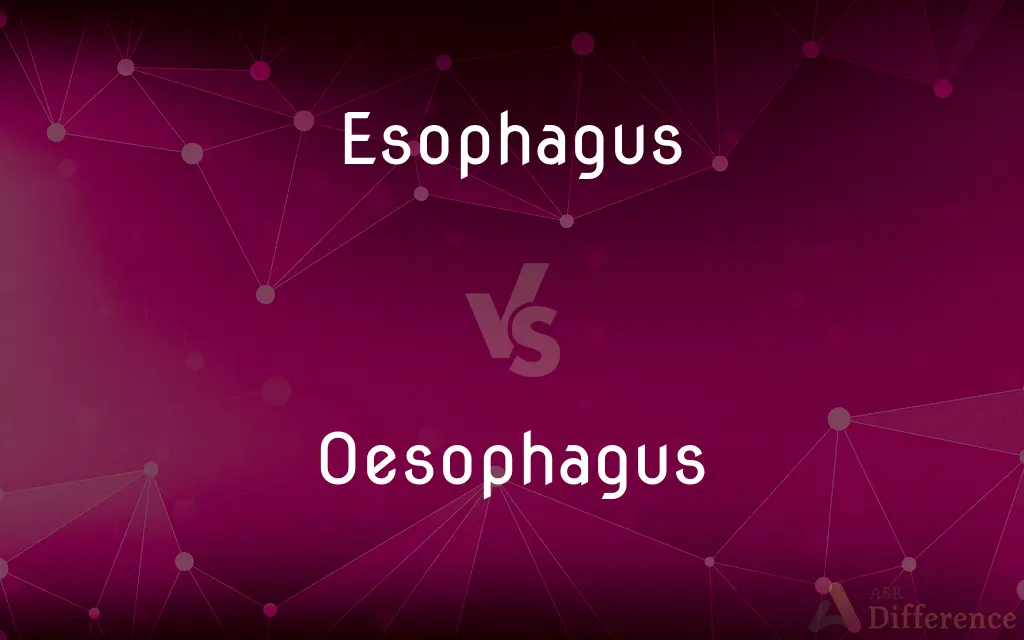Esophagus vs. Oesophagus — What's the Difference?
By Urooj Arif & Fiza Rafique — Updated on May 2, 2024
Esophagus is the American English spelling for the muscular tube that connects the throat to the stomach, whereas oesophagus is the British English variant.

Difference Between Esophagus and Oesophagus
Table of Contents
ADVERTISEMENT
Key Differences
Esophagus is the term used in American English to refer to the tube that carries food, liquids, and saliva from the mouth to the stomach. On the other hand, oesophagus is the spelling preferred in British English, reflecting a difference in linguistic conventions rather than function or anatomy.
Both terms describe the same anatomical structure, which plays a crucial role in the digestive system by enabling the passage of ingested materials. Whereas, the spelling variations are indicative of broader differences in medical and common terminology between American and British English.
The pronunciation of "esophagus" typically reflects the American English influence, with a more straightforward phonetic representation. In contrast, "oesophagus" often features a pronunciation that includes the initial "oe" sound, aligning with other British English words that retain classical or Latin origins.
In scientific literature and medical contexts, the usage of "esophagus" or "oesophagus" can indicate the regional origin of the publication or the preferred style guide of the journal. On the other hand, this does not impact the clinical or biological understanding of the structure.
Educational and medical institutions in the U.S. predominantly use "esophagus." Meanwhile, countries following British English standards, including the UK, Australia, and Canada, might opt for "oesophagus."
ADVERTISEMENT
Comparison Chart
Spelling
American English
British English
Usage
Used in the United States
Used in the UK, Australia, Canada
Pronunciation
/ɪˈsɑːfəɡəs/
/iːˈsɒfəɡəs/
Educational Influence
American schools and textbooks
British and Commonwealth schools
Medical Journals
American journals use "esophagus"
British journals use "oesophagus"
Compare with Definitions
Esophagus
Muscular tube in humans.
The esophagus is vital for swallowing.
Oesophagus
British term for esophagus.
The oesophagus is essential for digestion.
Esophagus
Connects throat to stomach.
Food travels down the esophagus after it is swallowed.
Oesophagus
Anatomical tube in the body.
The oesophagus connects the mouth to the stomach.
Esophagus
Subject of medical studies.
Esophagus disorders can cause significant discomfort.
Oesophagus
Involved in swallowing process.
Disorders of the oesophagus can interfere with eating.
Esophagus
Part of the digestive system.
The esophagus plays a key role in moving food.
Oesophagus
Focus of gastroenterology.
Oesophagus health is crucial for overall well-being.
Esophagus
Prone to various diseases.
Acid reflux can damage the lining of the esophagus.
Oesophagus
Can be affected by reflux.
The lining of the oesophagus can be eroded by stomach acids.
Esophagus
The esophagus (American English) or oesophagus (British English; both ), informally known as the food pipe or gullet, is an organ in vertebrates through which food passes, aided by peristaltic contractions, from the pharynx to the stomach. The esophagus is a fibromuscular tube, about 25 cm (10 in) long in adults, which travels behind the trachea and heart, passes through the diaphragm and empties into the uppermost region of the stomach.
Oesophagus
Variant of esophagus.
Esophagus
The muscular tube by which food passes from the pharynx to the stomach; the gullet.
Oesophagus
(anatomy) The tube that carries food from the pharynx to the stomach.
Esophagus
(American spelling) oesophagus
Oesophagus
Same as Esophagus, Esophageal, etc.
Esophagus
That part of the alimentary canal between the pharynx and the stomach; the gullet. See Illust. of Digestive apparatus, under Digestive.
Oesophagus
The passage between the pharynx and the stomach
Esophagus
The passage between the pharynx and the stomach
Common Curiosities
Why does American English use "esophagus"?
American English often modifies words to simplify spelling and pronunciation.
Is one spelling more correct than the other?
No, both spellings are correct within their respective linguistic contexts.
Are esophagus and oesophagus the same thing?
Yes, they refer to the same anatomical structure, with the difference being in spelling.
Is there any difference in pronunciation between esophagus and oesophagus?
Yes, pronunciation can slightly vary, especially with the initial sounds.
Which spelling should be used in scientific writing?
It depends on the style guide of the publication; American and British journals prefer their respective variants.
How do medical students learn about this difference?
Medical education includes awareness of linguistic variations depending on geographic location.
How should non-native English speakers decide which to use?
Non-native speakers should consider the form of English they are more exposed to or the one used in their study materials.
Can both terms be used interchangeably in medical contexts?
Yes, but the choice of term typically aligns with the regional linguistic preferences.
Does the spelling variation affect medical treatment or understanding?
No, the spelling does not influence medical understanding or treatment.
Are there any other examples where American and British English differ in medical terms?
Yes, such as "fiber" vs. "fibre" and "anesthesia" vs. "anaesthesia."
Share Your Discovery

Previous Comparison
Glutin vs. Gluten
Next Comparison
Alocasia vs. ColocasiaAuthor Spotlight
Written by
Urooj ArifUrooj is a skilled content writer at Ask Difference, known for her exceptional ability to simplify complex topics into engaging and informative content. With a passion for research and a flair for clear, concise writing, she consistently delivers articles that resonate with our diverse audience.
Co-written by
Fiza RafiqueFiza Rafique is a skilled content writer at AskDifference.com, where she meticulously refines and enhances written pieces. Drawing from her vast editorial expertise, Fiza ensures clarity, accuracy, and precision in every article. Passionate about language, she continually seeks to elevate the quality of content for readers worldwide.
















































